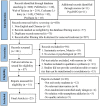Effects of exercise and psychological interventions on smartphone addiction among university students: A systematic review
- PMID: 36275318
- PMCID: PMC9580397
- DOI: 10.3389/fpsyg.2022.1021285
Effects of exercise and psychological interventions on smartphone addiction among university students: A systematic review
Abstract
Background and aims: Among the large number of studies on smartphone addiction, only a few randomized controlled trials on exercise and psychological interventions for smartphone addiction by university students have been published. This study aims to systematically investigate the impact of exercise and psychological interventions on smartphone addiction among university students.
Methods: The PRISMA guidelines were adopted for this systematic literature review. Prominent academic databases such as Web of Science, PubMed, ProQuest, Cochrane Library, China National Knowledge Infrastructure (CNKI) and PsycINFO were searched to find eligible studies published before Aug 2021. The overall quality of the articles was checked using the "QualSyst" tool by Kmet et al.
Results: From among 600 papers, 23 met the inclusion criteria and were incorporated into our systematic review. All of the studies were randomized controlled trials. The following thematic areas emerged as a result of the content analysis: study selection and design, as well as study characteristics (participants, intervention, comparisons, and outcomes).
Discussion and conclusion: The literature on exercise and psychological interventions for smartphone addiction is scarce. There is a need to introduce new interventions and to validate the effectiveness of combined interventions. Our findings suggest that exercise and psychological interventions may help to reduce smartphone addiction. This combination was more effective compare to exercise or psychological intervention on mental health and addiction among university students. Future research should combine exercise and psychological interventions, focusing on university students, especially females, who are vulnerable to smartphone addiction. Further studies should focus on the cross-section of neuropsychology, cognitive psychology, and sports science to provide combined interventions in physiological and psychological direction.
Systematic review registration: https://www.crd.york.ac.uk/prospero, identifier: CRD42021278037.
Keywords: exercise; intervention; psychological; smartphone addiction; university students.
Copyright © 2022 Liu, Soh, Samsudin, Rattanakoses and Qi.
Conflict of interest statement
The authors declare that the research was conducted in the absence of any commercial or financial relationships that could be construed as a potential conflict of interest.
Figures
Similar articles
-
Smartphone-Based Interventions to Reduce Sedentary Behavior and Promote Physical Activity Using Integrated Dynamic Models: Systematic Review.J Med Internet Res. 2021 Sep 13;23(9):e26315. doi: 10.2196/26315. J Med Internet Res. 2021. PMID: 34515637 Free PMC article.
-
Mixed comparison of interventions for different exercise types on students with Internet addiction: a network meta-analysis.Front Psychol. 2023 May 25;14:1111195. doi: 10.3389/fpsyg.2023.1111195. eCollection 2023. Front Psychol. 2023. PMID: 37303910 Free PMC article.
-
Adverse Effects of Smartphone Addiction among University Students in South Korea: A Systematic Review.Healthcare (Basel). 2022 Dec 21;11(1):14. doi: 10.3390/healthcare11010014. Healthcare (Basel). 2022. PMID: 36611474 Free PMC article. Review.
-
Effects of taichi on physical and psychological health of college students: A systematic review.Front Physiol. 2022 Sep 29;13:1008604. doi: 10.3389/fphys.2022.1008604. eCollection 2022. Front Physiol. 2022. PMID: 36246109 Free PMC article.
-
Effects of exercise interventions on Internet addiction among college students: A systematic review and meta-analysis of randomized controlled trials.Addict Behav. 2025 Jan;160:108159. doi: 10.1016/j.addbeh.2024.108159. Epub 2024 Sep 17. Addict Behav. 2025. PMID: 39303655
Cited by
-
Yoga as an Adjuvant with Multimodal Psychological Interventions for Excessive Use of Technology: A Randomized Controlled Trial from India.Int J Yoga. 2024 Jan-Apr;17(1):37-45. doi: 10.4103/ijoy.ijoy_187_23. Epub 2024 May 13. Int J Yoga. 2024. PMID: 38899141 Free PMC article.
-
Trialing a simple mobile phone dependency intervention strategy among Chinese college students.Sci Rep. 2025 Jul 9;15(1):24696. doi: 10.1038/s41598-025-09864-5. Sci Rep. 2025. PMID: 40634420 Free PMC article. Clinical Trial.
-
Exercise intervention to reduce mobile phone addiction in adolescents: a systematic review and meta-analysis of randomized controlled trials.Front Psychol. 2023 Dec 13;14:1294116. doi: 10.3389/fpsyg.2023.1294116. eCollection 2023. Front Psychol. 2023. PMID: 38192396 Free PMC article. Review.
-
The effect of 4-phenylbutyrate and sodium 4-phenylbutyrate on genetic mutation diseases: A meta-analysis.Medicine (Baltimore). 2025 Jan 10;104(2):e40818. doi: 10.1097/MD.0000000000040818. Medicine (Baltimore). 2025. PMID: 39792717 Free PMC article.
-
Do regular exercise, gender, and age influence smartphone addiction? Analyzing screen time and smartphone deprivation symptoms.Front Psychol. 2025 May 8;16:1586762. doi: 10.3389/fpsyg.2025.1586762. eCollection 2025. Front Psychol. 2025. PMID: 40406611 Free PMC article.
References
-
- Ajay Krishna G. S., Kodali M., Krishnamohan P., Sivashankar P. (2014). Effect of cognitive behavior therapy for problematic internet usage. Indian J. Psychiatry 56, S68.
-
- Alavi S. S., Ghanizadeh M., Mohammadi M. R., Jannatifard F., Alamuti S. E., Farahani M. (2021). The effects of cognitive-behavioral group therapy for reducing symptoms of internet addiction disorder and promoting quality of life and mental health. Trends Psychiatry Psychother. 43, 47–56. 10.47626/2237-6089-2020-0010 - DOI - PMC - PubMed
-
- Baumeister R. F., Vohs K. D., Tice D. M. (2007). The strength model of self-control. Curr. Dir. Psychol. Sci. 16, 351–355. 10.1111/j.1467-8721.2007.00534.x - DOI
-
- Beranuy M., Oberst U., Carbonell X., Chamarro A. (2009). Problematic Internet and mobile phone use and clinical symptoms in college students: the role of emotional intelligence. Comput. Human Behav. 25, 1182–1187. 10.1016/j.chb.2009.03.001 - DOI
Publication types
LinkOut - more resources
Full Text Sources
Miscellaneous


